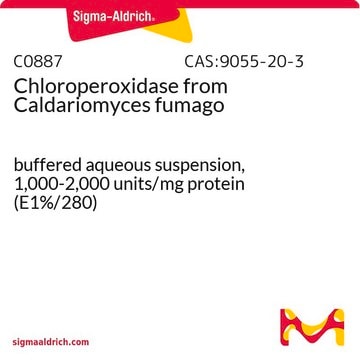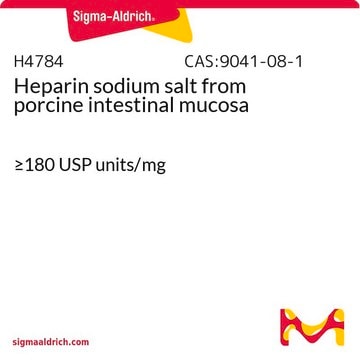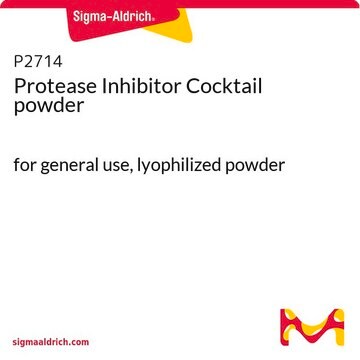C0278
Chloroperoxidase from Caldariomyces fumago
buffered aqueous suspension, ≥3,000 units/mL
Synonym(s):
Chloride Peroxidase, Chloride:hydrogen-peroxide oxidoreductase
Sign Into View Organizational & Contract Pricing
All Photos(1)
About This Item
CAS Number:
MDL number:
UNSPSC Code:
12352204
NACRES:
NA.54
Recommended Products
form
buffered aqueous suspension
mol wt
42 kDa
concentration
≥3,000 units/mL
shipped in
wet ice
storage temp.
2-8°C
Looking for similar products? Visit Product Comparison Guide
General description
Chloroperoxidase is a heme containing glycoprotein that is secreted from fungus. Chloroperoxidase (CPO) is a extracellular heme glycoenzyme containing ferriprotoporphyrin IX as the prosthetic group.
Application
Chloroperoxidase from Caldariomyces fumagois is useful alternative to lactoperoxidase for 131I ion labeling studies, for bromination of proteins, and for 36Cl labeling of macromolecules in long-term isolation procedures. It has been used to study biocatalytic oxidation in polymersome nanoreactors .
It has been used to study biocatalytic oxidation in polymersome nanoreactors.
A useful alternative to lactoperoxidase for 131I ion labeling studies, for bromination of proteins, and for 36Cl labeling of macromolecules in long-term isolation procedures.
Biochem/physiol Actions
Chloroperoxidase (CPO) is secreted from fungus and exhibits a broad spectrum of chemical reactivities. It is a peroxide-dependent chlorinating enzyme and it also catalyzes peroxidase, catalase and cytochrome P450-type reactions of dehydrogenation, hydrogenperoxide (H2O2) decomposition and oxygen insertion, respectively. The enzyme has magnetic and spectroscopic properties similar to that of cyctochrome P-450. CPO from the fungus Caldariomyces fumago has the capacity to chlorinate aromatic hydrocarbons, including polycyclic aromatic hydrocarbons (PAHs). PAHs are considered to be a potential health risk because of their possible carcinogenic and mutagenic activities and are widely dispersed in the environment.
Unit Definition
One unit will catalyze the conversion of 1.0 μmole of monochlorodimedon to dichlorodimedon per min at pH 2.75 at 25 °C in the presence of potassium chloride and H2O2.
Physical form
Crude suspension in 0.1 M sodium phosphate, pH ~4.5
inhibitor
Product No.
Description
Pricing
Signal Word
Danger
Hazard Statements
Precautionary Statements
Hazard Classifications
Resp. Sens. 1
Storage Class Code
10 - Combustible liquids
WGK
WGK 3
Flash Point(F)
Not applicable
Flash Point(C)
Not applicable
Personal Protective Equipment
dust mask type N95 (US), Eyeshields, Gloves
Certificates of Analysis (COA)
Search for Certificates of Analysis (COA) by entering the products Lot/Batch Number. Lot and Batch Numbers can be found on a product’s label following the words ‘Lot’ or ‘Batch’.
Already Own This Product?
Find documentation for the products that you have recently purchased in the Document Library.
C M Hosten et al.
The Journal of biological chemistry, 269(19), 13966-13978 (1994-05-13)
Near-ultraviolet resonance Raman spectra of chloroperoxidase derivatives and high valent intermediates show frequencies that can be systematically assigned. In accord with previous observations of low v4 frequencies for the ferric enzyme, and quite low v4 frequencies for the ferrous enzyme
R Vázquez-Duhalt et al.
Phytochemistry, 58(6), 929-933 (2001-10-31)
Chloroperoxidase from Caldariomyces fumago was able to chlorinate 17 of 20 aromatic hydrocarbons assayed in the presence of hydrogen peroxide and chloride ions. Reaction rates varied from 0.6 min(-1) for naphthalene to 758 min(-1) for 9-methylanthracene. Mono-, di- and tri-chlorinated
Marcela Ayala et al.
Journal of biological inorganic chemistry : JBIC : a publication of the Society of Biological Inorganic Chemistry, 16(1), 63-68 (2010-09-14)
Heme peroxidases are subject to a mechanism-based oxidative inactivation. During the catalytic cycle, the heme group is activated to form highly oxidizing species, which may extract electrons from the protein itself. In this work, we analyze changes in residues prone
Daniel Andrew et al.
Biochemical and biophysical research communications, 415(4), 646-649 (2011-11-15)
Azide is a well-known inhibitor of heme-enzymes. Herein, we report the counter-intuitive observation that at some concentration regimes, incorporation of azide in the reaction medium enhances chloroperoxidase (CPO, a heme-enzyme) mediated one-electron abstractions from several substrates. A diffusible azidyl radical
Adam C Chamberlin et al.
The journal of physical chemistry. B, 115(13), 3642-3647 (2011-03-18)
OLYP/TZP calculations on two symmetrized model complexes [Fe(TPP)(py)(2)](2+) and [Fe(TPP)(PhNC)(2)](2+) (TPP = meso-tetraphenylporphyrin, py = pyridine, PhNC = phenylisocyanide) reveal dense manifolds of low-energy electronic states. For the latter complex, broken-symmetry calculations successfully reproduce the unique S = 0 ground
Our team of scientists has experience in all areas of research including Life Science, Material Science, Chemical Synthesis, Chromatography, Analytical and many others.
Contact Technical Service







